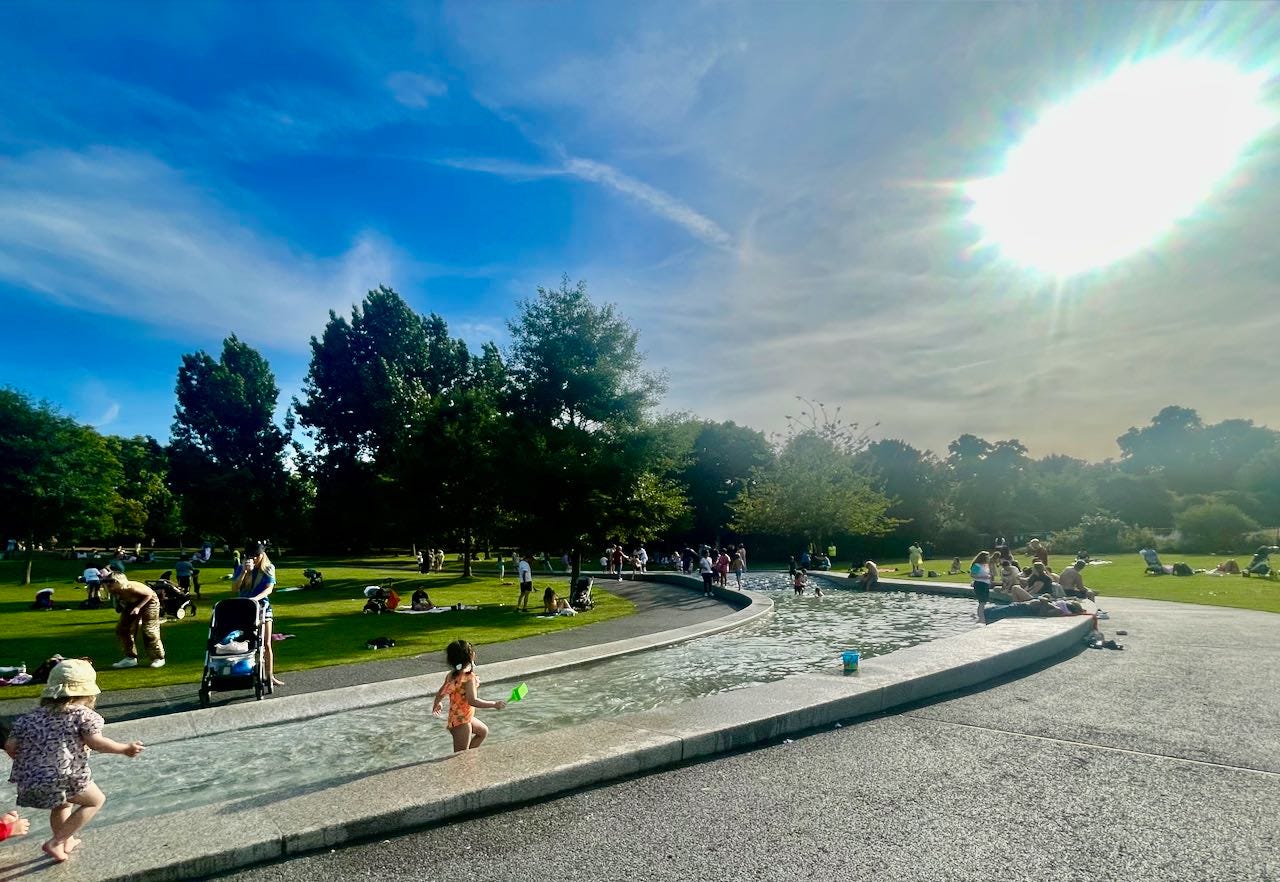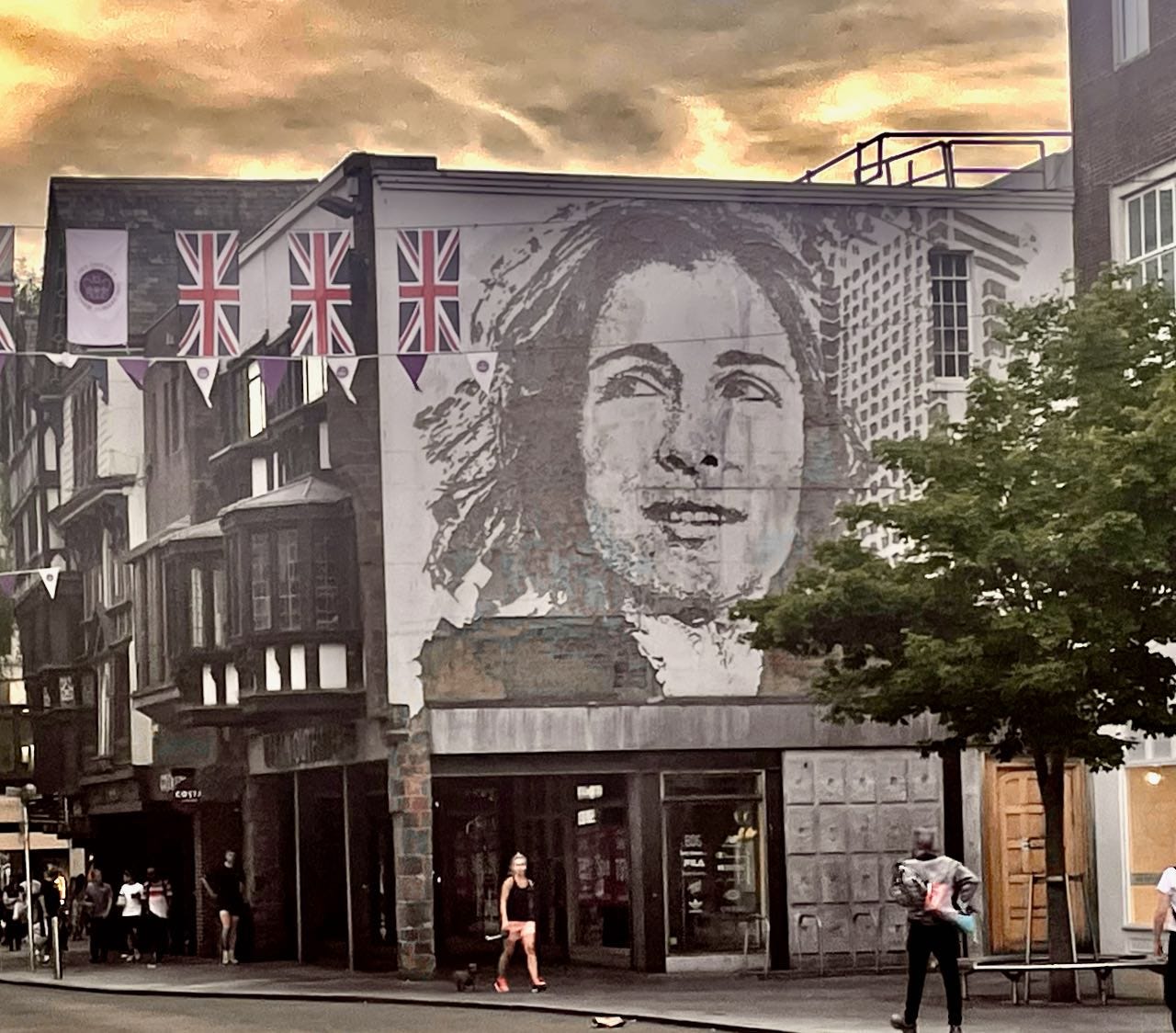London Delights: Wisdom From An Overheated Island
Where the cathedrals are blessedly cool, the art is hot, and musical irony abounds.
As always, if you love It’s Not Just You, forward to a friend, and if you’re not a subscriber, or sign up for free here.
Every July, verdant foliage born into the cool drizzle of an English Spring gets walloped by bouts of heat and sun. But this summer has been particularly intense for Britain. Record-breakingly hot days staggered by without a cloud, Royal air force planes were grounded when tarmacs started to melt, and a blustery blond Prime Minister resigned suddenly after being ejected by his own party for repeated mendacity. (Imagine that!)
Meanwhile, visitors like me flooded London at pre-COVID levels, moving through the streets in sweaty groups, unsure of what to do with ourselves as temperatures climbed toward and later passed 100 degrees Fahrenheit. Everything seemed hazy and untethered.
Of course, I could be projecting. Walking through a parched Hyde Park, I saw six or seven people standing perfectly still in a half circle around a huge tree. They had one arm outstretched, palm up, eyes skyward. I thought it was a religious thing, like a pray-in – maybe in hopes of relief from the weather or forgiveness from mother nature for our transgressions. But when I got closer, I could see they were holding little pieces of fruit – offerings to attract luminously green parakeets hidden in the tree. Context is everything.
The birds would alight delicately, resting for a second on the fingers of their acolytes, snatch their prize, then disappear again among the green leaves. You might ask: Why does London have wild parakeets? As legend has it, while Jimi Hendrix was living in London during the swinging 60s, he released a breeding pair of ring-necked tropically green parakeets named Adam and Eve into the city. Other explanations allege that these birds, native to Africa, are descendants of escapees from Henry the VIII's menagerie. But they are likely just former pets that flocked together for protection and have been breeding ever more successfully over the decades.
And now, like Starbucks, parakeets are all over the city.
At one point, in a little restaurant inside Hyde Park, I saw that the bar had Aperol Spritz on tap right next to the British beers, like an orange interloper. Did I mention it was a prosecco drink ON TAP? This minor affront to English bartenders was disorienting and funny at the same time.
Apparently, Italian cocktails and embarrassing politicians are everywhere now. And yet, it's still tempting to assume that our favorite people and countries aren't going to change when we've been away for a bit. But great nations wobble, borders move, and the startling developments of a few years prior are soon unremarkable. At Paddington Station, the new post-Brexit passport checks for passengers boarding Eurostar trains to France are already routine to Brits who lined up with their international travel documents ready. And soon enough, 104-degree summers will be as ordinary in England as wild parakeets.
I came to this side of the Atlantic for my lovely Goddaughter's graduation from a university a few hours south of London. In an ambitious post-pandemic catch-up, the school recognized three years of Arts and Humanities graduates in a single ceremony replete with the extravagant robes and floppy hats of British academia. We were treated to a deeply satisfying parade of flowing gold, blue and crimson satin with velvety, sparkle-encrusted sleeves. A joyful interlude between disturbances, both political and environmental.
The graduation hall had air conditioning, not a minor miracle in England. Better yet, the speeches were short and cheerful. And then, after an uncountable number of names were read and all those young lives were launched into this hot and unpredictable world, the chancellor dismissed us. As we stood to leave, the band began to play the theme song to "Monty Python's Flying Circus," the iconic British comedy show whose goofy animated intro ends with a giant foot squishing a chicken man to the sound of a whoopie cushion. I assumed the school was having a bit of fun after a difficult few years, and what a fantastic touch.
But nope, this wasn't a wink-wink, nudge-nudge rendition. What I knew only as an ironic takedown of pomposity started as a celebrated march by the American composer John Philip Sousa. And better yet, it's played not only at British graduations, but by the U.S. Marine Band at almost every presidential inauguration. (Sans silly walks or whoopie cushion sounds, of course. For now, anyway. I'm not sure anyone wants to place bets on the constancy of American political traditions these days.)
And that wasn't the only time I was ambushed by musical irony in England. Earlier in the week, I visited St. Albans cathedral, one of Britain's oldest churches. It was built with brick from the ruins of a nearby Roman village around the time of the Norman invasion. The air inside was gloriously cool, and you could see how the Roman arches gave way to the spiky Gothic bits as one era replaced another layer by layer in fits and starts. Evidence that even when you can identify the start of a massive transformation in hindsight, in real-time, these shifts aren't instant; they happen stone by stone, person by person, town by town.
A kindly docent greeted me and gently suggested I not clatter loudly into the nave during services. He explained that St. Alban was Britain’s first Christian martyr, a third-century youth and early convert to Christianity who was beheaded for his faith. I also learned that the English churchmen and barons who drafted the Magna Carta met at St. Albans in 1213 to hash out their early ideas about habeas corpus and how all people and institutions should be accountable to the law.
Two thousand years of history in one spot was more than my tiny American brain can handle. So I thanked the docent and sat down in a side chapel where I could hear the sermon and look at the ceiling, which had a pattern of golden sheep-like animals and large-clawed birds amid a field of black and red roses. The flowers commemorate Britain's Wars of the Roses, otherwise known as the Civil Wars, a series of 15th-century battles for the crown that lasted for 30 years.
I'd forgotten that this famous war was not one fight, but multiple civil conflicts over decades. It reminded me of a recent survey in which half the Americans polled said they thought there would be a U.S. Civil War "in the next few years." Aptly, the minister's sermon on that hot Sunday was about neighborliness that defies national borders and religious boundaries. And to close out, a children's choir began to sing something that was confoundingly familiar.
Even accompanied by an organ, the lyrics were suspiciously corny, and I soon recognized the song. It repeats endlessly at every Disney theme park as visitors wend their way via boat through a strange landscape of animatronic dolls in national costumes. And yet, that dumb tune moved me. Maybe because after years apart, thanks to quarantines and wars and climate-change catastrophes, it’s more evident than ever how entwined we still are.
And that is how I found myself weeping with the tombs of martyrs under my feet as little British kids sang "It's a Small World (After All)."
MORE TRAVEL: Driving to Odesa On a Very Warm September Day
U.K. GALLERY


It’s Not Just You is a free weekly essay, uplifting recommendations, and a community of thousands. If you love it, sign up for a free subscription or consider supporting my work with a paid subscription at a discounted rate here:
If you’re already a paid subscriber, your monthly payments should have been paused for the last few weeks while I’ve been on the road. If not, just let me know by replying to this email and I’ll extend the rebate. And, thank you.









Susannah!
Good to have you back, even if you never left. We hope to return to the UK: IF the GD pandemic ever ends. Or mutates into something unimaginable. It always brightens my day to read your thoughts.
Irie! Cal(lahan)
"And then, after an uncountable number of names were read and all those young lives were launched into this hot and unpredictable world..." makes one apprehensive and sentimental. So thoughtful an observation.